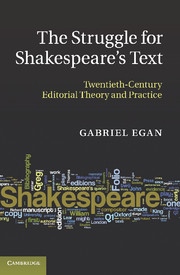Book contents
- Frontmatter
- Contents
- Preface
- Acknowledgements
- A note on references, quotations, names and pronouns
- Introduction
- 1 The fall of pessimism and the rise of New Bibliography, 1902–1942
- 2 New techniques and the Virginian School: New Bibliography 1939–1968
- 3 New Bibliography 1969–1979
- Intermezzo: the rise and fall of the theory of memorial reconstruction
- 4 New Bibliography critiqued and revised, 1980–1990
- 5 The ‘new’ New Bibliography: the Oxford Complete Works, 1978–1989
- 6 Materialism, unediting and version-editing, 1990–1999
- Conclusion: the twenty-first century
- Appendix 1 How early modern books were made: a brief guide
- Appendix 2 Table of Shakespeare editions up to 1623
- Appendix 3 Editorial principles of the major twentieth-century Shakespeare editions
- Works cited
- Index
Appendix 3 - Editorial principles of the major twentieth-century Shakespeare editions
Published online by Cambridge University Press: 06 December 2010
- Frontmatter
- Contents
- Preface
- Acknowledgements
- A note on references, quotations, names and pronouns
- Introduction
- 1 The fall of pessimism and the rise of New Bibliography, 1902–1942
- 2 New techniques and the Virginian School: New Bibliography 1939–1968
- 3 New Bibliography 1969–1979
- Intermezzo: the rise and fall of the theory of memorial reconstruction
- 4 New Bibliography critiqued and revised, 1980–1990
- 5 The ‘new’ New Bibliography: the Oxford Complete Works, 1978–1989
- 6 Materialism, unediting and version-editing, 1990–1999
- Conclusion: the twenty-first century
- Appendix 1 How early modern books were made: a brief guide
- Appendix 2 Table of Shakespeare editions up to 1623
- Appendix 3 Editorial principles of the major twentieth-century Shakespeare editions
- Works cited
- Index
Summary
The following are significant Shakespeare editions since 1899 with descriptions of their editorial approaches, cross-referenced to discussions of the editions or their ideas in the main body of this book. Only editions that stimulated debate about what editors should do or that helped establish Shakespeare's texts are included, so for example the New Variorum Shakespeare (1936–55), most facsimiles and a number of best-selling complete works editions are omitted. David Bevington's complete works was made by successive revisions of Hardin Craig's lightly corrected version of the Victorian Globe text, which iteratively narrowed the differences between itself and twentieth-century editions made from first principles (Shakespeare 1951a; 1973; 1980a; 1992a; 1997a). Thus, from a bibliographical point of view Bevington's edition is only belatedly theorized. The source for publication information is Andrew Murphy's Shakespeare in Print or the books themselves where they disagree (Murphy 2003, 367–86). Series are deemed to end when the final volume is published for the first time. The absence of an edition or series recorded by Murphy indicates that it made no significant contribution to the editorial tradition.
Comparing the development of theory and practice in Shakespeare editing across the century, the starkest fact is how seldom people at the heart of the former were engaged in the latter. A. W. Pollard and W. W. Greg produced no significant editions of Shakespeare, and aside from certain proof pages (Wells 1984, v) neither did R. B. McKerrow.
- Type
- Chapter
- Information
- The Struggle for Shakespeare's TextTwentieth-Century Editorial Theory and Practice, pp. 240 - 271Publisher: Cambridge University PressPrint publication year: 2010



